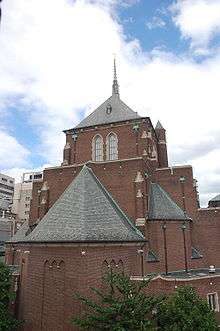Irvine Auditorium


Irvine Auditorium is a performance venue at 3401 Spruce Street on the campus of the University of Pennsylvania, in Philadelphia. It was designed by the firm of prominent Philadelphia area architect Horace Trumbauer and built 1926–1932.[1] Irvine Auditorium is notable for its nearly 11,000-pipe Curtis Organ, the world's 22nd-largest pipe organ (by ranks),[2] originally built for the Sesquicentennial Exposition of 1926 and donated to the university in 1928. The building was opened in May, 1929.
A persistent but untrue campus legend holds that the building was a Penn architecture student's design project that received a failing grade. He was forced to give up architecture to go into business, where he amassed a fortune. Years later, he made a major bequest to the university in his will, but only on the condition that his project be built.
Seating capacity is 1,260.[3] (Prior to renovation the seating capacity was 1,976.) The octagonal auditorium featured side balconies that faced each other, at right angles to the stage. The building was restored and renovated in 1997–2000 by Venturi, Scott Brown & Associates, Inc, who removed the side balconies to improve the acoustic quality, as well as to create more intimate performance spaces.
References
- ↑ The firm's Chief Designer (from 1909 until its demise) was Julian Abele, an African-American, who contributed to and may have designed this and other notable projects. But, without evidence, attributing the Trumbauer firm's buildings wholly or primarily to him is conjecture.
- ↑ The World's Largest Pipe Organs Archived 2010-08-30 at the Wayback Machine.
- ↑ Irvine Auditorium at University of Pennsylvania
